I’m a Drama Student in Japan. / わたしはドラマ学生日本で。/ watashi wa dorama gakusei nihon de.
To Ponder…
This blog post will include the use of Boud et al’s Model of reflection to evaluate and reflect upon the simulated interviews (see figure 1).
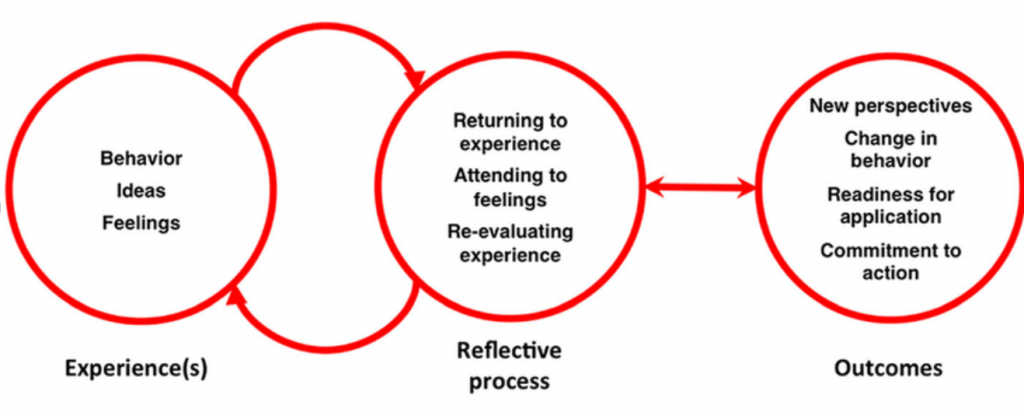
I will use this reflective model to investigate my behaviour, ideas and feelings, before diving into the experience as a whole and what I have gained/learned from the experience. Initially, I was calm and well-composed the week leading up to the interview, however, as the interview drew closer I became slightly more nervous. The idea of being interviewed by my peers for a job I would love was incredibly daunting. In order to combat this anxiety, I prepared myself for different questions and scenarios that could possibly be asked as preparation can help ease the feeling of nervousness.
Show Week!
The job position that chose to be interviewed for was the JETUK (Japanese Exchange Teaching) Programme. I chose this as it is a job that is incredibly interesting to me; being able to teach children life lessons and watching them succeed is vital to why I do what I do. I would love to incorporate drama into this position while teaching the kids lessons which will hopefully help them learn easier. This position is incredibly competitive with a tough selection process; the job description, however, implies a relaxed and out-going position (See Figure 2)…perfect for me!
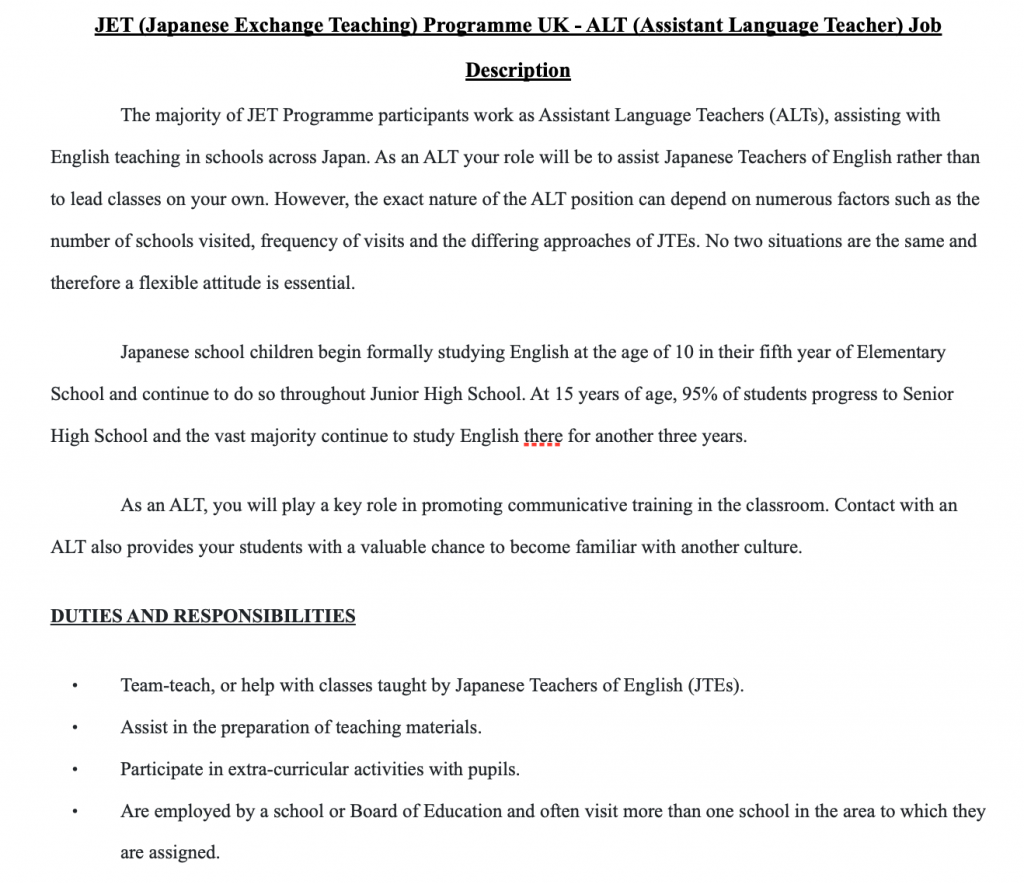
My initial idea for this position was that I had to be incredibly relaxed, and open when it comes to communicating with the interviewers as this is an English language teaching position. In order to approach this with being relaxed in mind, I had to prepare extremely well so that I did not falter. This preparation allowed for me to also remain relaxed on the run-up to the simulated interviews, compared to that of being anxious thinking about my peers interviewing me.
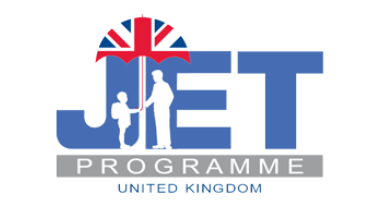
Part of my preparation for this interview included starting Japanese lessons with Queens University Belfast and Yoko-Suto Murphy; this will help me understand why I would love this position and will prepare me well if there are any Japanese language tests. I picked up lessons so that I would also be able to greet (御はいよ – Good morning) and thank my interviewers with respect (ありがと – Thank You). Questions that I looked into included; ‘Why do you want to teach and live in Japan?’, ‘describe two of your weaknesses’, ‘What could you bring culturally to this position’, and ‘How would you communicate to Japanese children who speak little to no English?’. Researching and answering these questions allowed me to have a general idea of what I would be answering during the interview, therefore relaxing me on the run-up.
Post-preparation, we had to conduct the simulated interviews; on the morning of that day I felt ready and relaxed before sitting in front of my peers to be assessed. The room was set up to have four interviews simultaneously being conducted, therefore the nerves were eased off.
Curtain Up
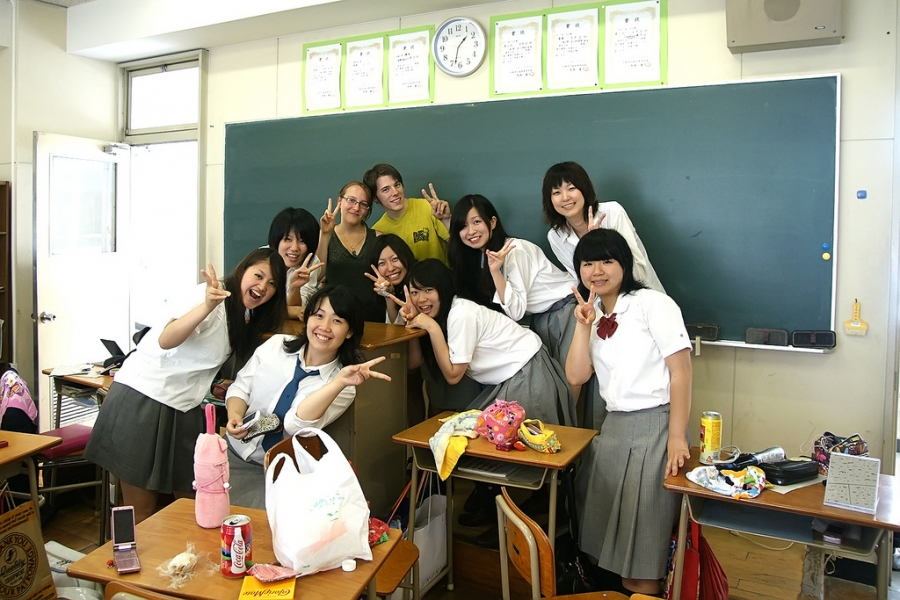
Casting my mind back to the simulated interviews has allowed me to realise how well prepared I actually was; I answered each question asked with confidence and firm answers, I related my past experience to the current job position, and I brought in current experiences. I walked in confidently and gave each interviewer a smile and greeting, unfortunately, due to the current climate I couldn’t shake each of their hand. Each answer I gave was backed up with examples and true experiences allowing me to give off a good impression. I explained how I have experience in learning Japanese, the Japanese culture and Japanese cuisine. One question that allowed me to really show off was a question about Noh Theatre; I was able to apply my knowledge and experience of writing an essay for Noh Theatre and how I was given the opportunity to research into the masks, music and costumes. Unfortunately, I have not received the feedback forms that were filled out by my peers, therefore I struggle to assess the interview to the fullest. However, I do believe that I performed/presented myself incredibly well. I am very happy with the interview as a whole, however, I did not get the chance to properly show off my Japanese.
Post-Show Blues
Reflecting upon this experience allowed me to prepare for the real interview the day after the simulated interview. I believe I should have gone over and above with the preparation in terms of greetings, replies, predicting questions, and preparing questions to ask. One thing I didn’t get to include in my simulated interview was myself asking a couple questions about the position as we ran out of time. I believe if I was asked if I had any questions would have allowed me to prepare myself better for the actual interview. The simulated interview was much more formal compared to the actual interview; the interviewer for the JETUK Programme wanted the interview to be very relaxed and conversational, however, I did feel incredibly prepared and well versed when it came to the real thing.
List of Images:
Figure 1: ‘Boud et al’s Reflective Model’. 2020. Accessed 16/02/2022. https://www.researchgate.net/figure/The-Boud-et-al-1985-model-of-reflection_fig1_344003449.
Figure 2: Charlie McCready, JETUK Job Description (Pages)
Figure 3: ‘JETUK’, Accessed 16/02/2022. https://www.jet-uk.org.
Figure 4: ‘Class 3-D by Innocent Coppieters’. Accessed 16/02/2022. https://globalgraduates.com/articles/jet-programme-japan.
You May Also Like

So You Want To Be A Teacher?
17 February 2022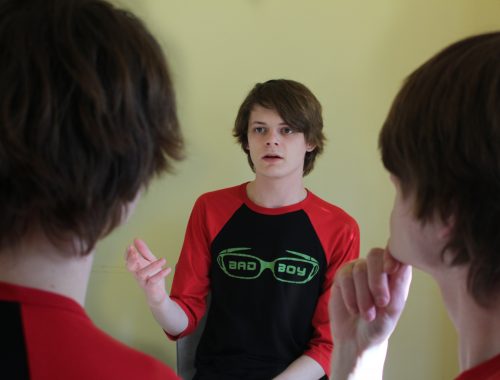
Shocker, Tom also sucks at interviews!
18 February 2022
